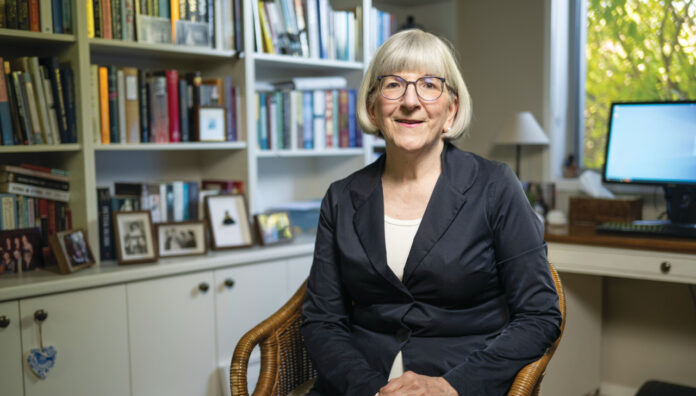Tracking war brides who married US servicemen to supporting accredited pharmacists at their new PSA ‘home’, Sarah Gillespie FPS has done it all.
Tell us about your accreditation and what led to it?
After studying at the South Australian Institute of Technology and becoming registered in the early 1980s, I worked in both community and hospital pharmacy and overseas. I became accredited in 2004, keen for my career to become more diverse. For 8 years I was the Executive Officer of the Research and Ethics Committee at the Repatriation General Hospital in Adelaide, an important role for me, but conducted Home Medicines Reviews (HMRs) in addition.
How long were you with the former Australian Association of Consultant Pharmacy (AACP)?
My husband was posted to Washington DC for 2 years as an Australian liaison officer with the Pentagon.
On our return to Canberra I was asked to join the AACP by its former CEO Col (Rtd) Bill Kelly FPS. I was there, part of a small team, helping organise the former ConPharm conference and supporting accredited pharmacists with an evolving role for 15 years until the AACP closed in December 2022 and I took on my current position as PSA’s Pharmacist Accreditation Manager.
Why would a registered pharmacist become accredited?
Some pharmacists use it as Continuing Professional Development (CPD). Others want to conduct Commonwealth-funded (since 1997) remunerated medication reviews – HMRs and Residential Medication Management Reviews (RMMRs) in aged care facilities.
Why is PSA the natural home for accredited pharmacists?
The PSA is the peak professional body for pharmacists, represents all pharmacists, offers CPD and is the right fit for accredited pharmacists. It supports pharmacists and has the vision for the profession’s future. Accreditation also aligns with the delivery of safe, effective quality health care.
When the AACP closed, I wanted to align myself with PSA, even before I became an employee. I’d like to think I also bring the support and the care and nurturing for PSA member accredited pharmacists and for candidates in the accreditation assessment process to my new role.
And what about the war brides?
During my 2 years in Washington DC, I was pleased to discover how pharmacist skills were adaptable in my job at the Australian Embassy. With my research background I was asked to find Australian war brides of US servicemen in World War 2 to coincide with an Embassy event being held to commemorate the first time Australian and US soldiers fought together.
Of the 10,000–15,000 estimated war brides from WW2, we found hundreds still living across America and in the end 110 wives and families were among the 500 who attended on Anzac Day 2007.
What are the benefits of gaining accreditation via PSA?
The PSA is one of only three organisations authorised to accredit pharmacists to conduct RMMRs. Candidates are supported for the duration of the accreditation assessment program by a dedicated team.
Case study assessments are marked by an experienced group of accredited pharmacists, there is a discount for PSA members and the PSA website provides resources and CPD opportunities.
Any advice for pharmacists at any career stage considering accreditation?
Do it! Absolutely! And make a difference. Use your professional knowledge and skills to really do something that is rewarding in the community, especially for those living at home that have problems managing their medicines – quite apart from adherence. The World Health Organization produced a report 20 years ago now which stated: ‘The best medication in the world is completely ineffective unless people take it’. That is really important. Taking time to chat with people in their homes about how they manage their medicines, answering their questions, liaising with their GP and with their community pharmacy – it’s a no-brainer!



 John Jones MPS, pharmacist immuniser and owner of My Community Pharmacy Shortland in Newcastle, NSW[/caption]
John Jones MPS, pharmacist immuniser and owner of My Community Pharmacy Shortland in Newcastle, NSW[/caption]


 Debbie Rigby FPS explaining how to correctly use different inhaler devices[/caption]
Debbie Rigby FPS explaining how to correctly use different inhaler devices[/caption]




 Professor Sepehr Shakib[/caption]
Professor Sepehr Shakib[/caption]

 Lee McLennan MPS[/caption]
Lee McLennan MPS[/caption]
 Dr Natalie Soulsby FPS, Adv Prac Pharm[/caption]
Dr Natalie Soulsby FPS, Adv Prac Pharm[/caption]
 Joanne Gross MPS[/caption]
Joanne Gross MPS[/caption]








